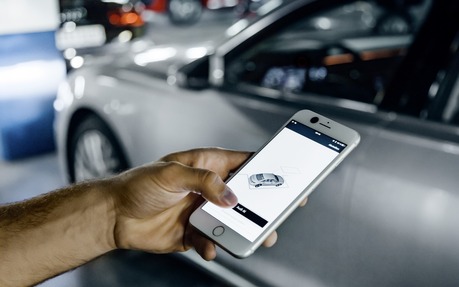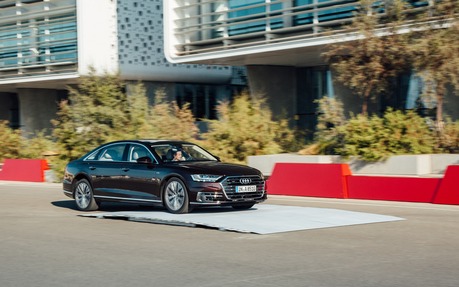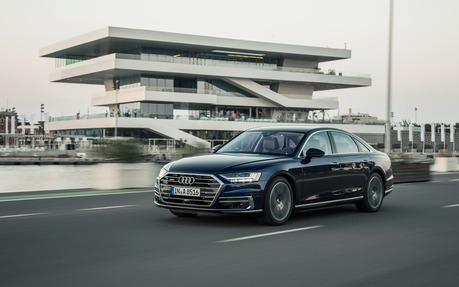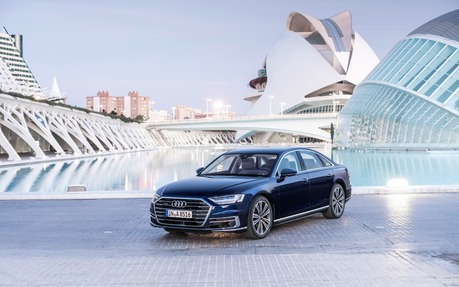2019 Audi A8: The Uber-techno Flagship Sedan
The fourth-generation Audi A8 is a technological tour de force. It will arrive in Canadian showrooms in the third quarter of 2018, as a 2019 model, and it will come loaded with so much technology that it will be capable of driving itself.
The Audi A8 is the first production model capable of level 3 autonomous driving, meaning that it can take over completely from the driver when travelling at speeds below 60 km/h on a divided highway when the Traffic Jam Pilot system is engaged.
- Also: 2019 Audi A8: We’re Driving it This Week
- Also: 2019 Audi A8: The Audi that Drives Itself in Traffic
We were driven by this system while riding in a prototype of the new A8 in Dusseldorf’s rush hour traffic a few weeks ago. From a legal standpoint, only one country (Germany) and one American state (Florida) currently allow this level of autonomous driving, but it is expected that many countries will soon implement changes in legislation to authorize autonomous driving. The new Audi A8 is ready and is just waiting for the rest of the world to catch up.
Usable technology for convenience
The A8 also has two key convenience features named Audi AI remote parking pilot and Audi AI remote garage pilot, both of which make parking convenient by autonomously driving the A8 into parallel or perpendicular parking spaces as well as garages, and by driving the car back out. The driver monitors the manoeuvring, but does not need to be sitting in the vehicle, as both systems can be started using a smartphone featuring the new myAudi app.

Usable technology for dynamics and comfort
Audi’s Traffic Jam Pilot and the other features of the Audi Intelligence system are very impressive, but they are not the only high-tech systems of the new 2019 Audi A8. Built on a very rigid platform made of aluminum, high-strength steel, magnesium and carbon fibre, the A8 features mild-hybrid powertrains, an optional four-wheel steering system as well as an optional fully-active electromechanical suspension.
Powered by the car’s 48-volt electrical system, this suspension allows for optimal body control by raising or lowering individual wheels to reduce roll while cornering or pitch and squat during braking and acceleration. When the car is being driven at speeds below 80 km/h, the front-facing camera is also called into play to scan the road ahead for bumps and potholes to pre-condition the suspension system and allow the car to glide over them. We experienced this first-hand during a demo and found that there was quite a difference driving over the bumps with the system off and with the system on when the bumps were still felt, but to a much lesser degree.

Usable technology for safety
Another great feature of this suspension system is that it also increases passive safety. In the event that the 2019 Audi A8 will be struck in the side by another vehicle, the body is raised by up to 80 millimetres within a half-second, so that the other vehicle will impact the more resistant sill of the A8 to better protect passengers. Finally, to allow for easier access to when entering or exiting the A8, the suspension system will raise the car’s body by 5 centimetres when any door is opened.
Driving the new A8
With the fourth-generation model, Audi is ushering in a new nomenclature for the A8 which has no relevance to engine displacement, but is meant to provide an equivalency between the power outputs of its conventional engines and the forthcoming hybrid-electric or fully electric powerplants.
The first variant to arrive in Canada will be the A8 55 TFSI which is powered a turbocharged, 3.0-litre V6 developing 340 horsepower and 368 pound-feet of torque. Coming later will be the A8 60 TFSI powered by a twin-turbo, 4.0-litre V8 good for 460 horsepower and 486 pound-feet of torque.
Both these engines are equipped with mild-hybrid technology by way of a belt alternator starter (BAS) and a lithium-ion battery with 10-Ah electrical capacity, meaning that the 2019 Audi A8 can coast at speeds between 55 and 160 km/h with the gasoline engine off and with zero emissions for up to 40 seconds. As soon as the driver steps on the gas again, the BAS prompts the smooth restart of the engine.
On the roads near Valencia in Spain, the V6-powered A8 made good use of its very flat torque plateau, with all 368 lb.-ft. of torque available between 1370 and 4500 rpm. The standard quattro all-wheel drive system and eight-speed automatic gearbox enabled the A8 55 TFSI to accelerate from 0 to 100 km/h in 5.7 seconds, a very respectable figure for a large luxury sedan. As expected, the V8-powered A8 feels about a second quicker.
What is remarkable is how quiet and serene the A8 60 TFSI feels, even when the car is hustled on secondary roads in Dynamic mode, thanks in part to the addition of an active noise cancellation system. Further down the line, we will see the arrival of a W12-powered variant as well as a plug-in hybrid version, whose 14.1-kWh lithium-ion battery will be charged by an induction pad mounted on the floor of its parking space.
The character of the A8 depends very much on the driver’s choice of the driving mode. When Dynamic is selected, the car handles weight transfers remarkably well, except perhaps in quick lateral transitions when you feel the car’s mass a little bit more. In tight hairpins and slower corners, the standard four-wheel steering system turns the rear wheels in the opposite direction of the fronts by up to five degrees, making this large sedan much more agile at speeds below 60 km/h. When driven in Comfort mode, the car’s ride is more relaxed, but the A8 still felt very well planted with impressive dynamics.

Complex, but not complicated
The 2019 Audi A8 showcases the brand’s new design language, first shown on the Audi Prologue concept car, which bowed at the Los Angeles Auto Show in 2014. The signature hexagonal Singleframe grille is now much larger and extends below the headlights, while a lighted strip links the taillights, producing a sharp, almost understated look.
That clean, almost understated aesthetic is echoed by the reductionist design of the cabin where most of the conventional switchgear has been replaced by two large tactile displays with haptic feedback that are very intuitive. All seats are heated, ventilated and have several massage functions. The right rear passenger can even enjoy a foot massage when the ottoman-style footrest is deployed while a removable electronic tablet, located on the rear centre console, allows passengers riding in the back to interact with comfort and infotainment features.
With the fourth-generation A8, the Audi brand is clearly signaling its intention to be recognized as the leader in sophisticated yet usable technology features. The brand’s large flagship sedan will become even more impressive on that front when its level 3 autonomous driving functions are fully deployed.
| Test drive report | |
| Test model | 2019 Audi A8 |
|---|---|
| Trim level | 3.0 TFSI Quattro Tiptronic |
| Price range | N/A |
| Price as tested | N/A |
| Warranty (basic) | N/A |
| Warranty (powertrain) | N/A |
| Fuel economy (city/highway/observed) | 10,2 / 7,7 / N/A L/100km |
| Options | Active electromechanical suspension, Four-wheel steering |
| Competitive models | BMW 7 Series, Cadillac CT6, Jaguar XJ, Lexus LS, Maserati Quattroporte, Mercedes-Benz S-Class, Porsche Panamera, Tesla Model S |
| Strong points |
|
| Weak points |
|
| Editor's rating | |
| Fuel economy | Fuel consumption rated at 10.2 L/100 km in the city and 7.7 on the highway. |
| Comfort | Excellent comfort level, especially aboard the V8-powered A8 60 TFSI which is equipped with an active noise cancellation system. |
| Performance | Very adequate performance level with the turbocharged V6, and even better with the twin-turbo V8. |
| Infotainment | Very intuitive two-screen setup with haptic feedback. |
| Driving | The driving dynamics of the new A8 are impressive for a large luxury sedan. |
| Overall | The new fourth-generation A8 plays the tech card to full effect. |
